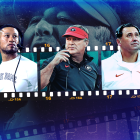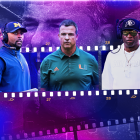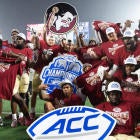Central Michigan's Hail Mary lateral touchdown to beat Oklahoma State 30-27 likely won't be topped as the most thrilling finish of Week 2. It might not be topped at all this year.
It was also an ending that never should have happened.
With time expiring, Oklahoma State quarterback Mason Rudolph was hit with an intentional grounding penalty on fourth down. Central Michigan was then given one untimed down to finish the game. Of course, we know what happened next ...
Unbelievable! @CMU_Football shocks #22 @CowboyFB 30-27 with a ridiculous play to end the game! https://t.co/kOvdA4ldZq
— FS1 (@FS1) September 10, 2016
However, NCAA rules dictate: "The period is not extended if the foul is by the team in possession and the statement of the penalty includes a loss of down."
In short, the game's Mid-American Conference officials misapplied the rule and the Big 12 replay booth failed to identify it. The MAC confirmed as much after the game, as did the Big 12. Referee Tim O'Dey spoke to Berry Tramel of The Oklahoman about the failures as well. The transcript below is courtesy of Oklahoma State athletics:
Q: On the extension of the game - we've always heard that the game can't end on a defensive penalty. What's the rule that extends the game on an offensive penalty?
A: There's a rule that says that the game cannot end on an accepted live ball foul. That's the rule. There's an exception to the rule that says if enforcement of the foul involves a loss of down, then that brings the game to an end. So in that situation, we've had the opportunity to run it back through our hierarchy, which includes the national rules editor, and he confirmed that should have been a loss of down and the end of the game at that point, so that extension should not have happened.
Q: So it's not the offense or defense - it's the loss of down?
A: The accepted live ball foul will extend any period, unless there is an exception that applies to that rule, and there's an exception which applies to a loss of down foul, which intentional grounding is a loss of down foul. If the penalty statement includes the statement 'loss of down' then the game ends on that play.
Q: It was a loss of down. I think you announced it as a loss of down, even.
A: (no verbal answer, but nods head yes)
Q: Okay.
Q: So what you're saying is that the game should have ended and it should not have been Central Michigan's ball, just to be clear.
A: That is the interpretation from the rules editor - the national rules editor, yes.
As you can see, the rule as stated by the NCAA is black-and-white in nature -- it's not a judgment call -- but it's convoluted to explain and was obviously misapplied here. So the next question becomes whether the result should be overturned.
The short answer? No.
Results in college football are final. They can be forfeited later for a number of reasons, but they aren't overturned. Think of Miami's eight-lateral touchdown to beat Duke last year. The ACC officials were suspended following that result, but it stood.
That touchdown shouldn't have counted either for multiple reasons, but ultimately it stood based on subjective reasoning. In that way, it differs from this situation. The refs in Central Michigan-Oklahoma State simply misapplied a rule.
Still, the outcome of the Miami-Duke game wasn't overturned, and this one won't be, either. You can expect more public statements before this thing is all said and done, but they'll probably say some variation of, "It stinks, but there's nothing that can be done."
Furthermore, Stewart Mandel of Fox Sports tweeted that the NCAA isn't responsible for officiating as college athletics' governing body:
Also, the NCAA does not oversee officiating. MAC officials were working the game, so the MAC determines how it's handled.
— Stewart Mandel (@slmandel) September 10, 2016
Central Michigan shouldn't have won, but Oklahoma State also shouldn't have been in that situation. It happened, though, and it's something from which the Cowboys will have to move on, some way, some how.





















